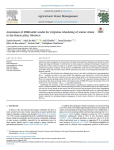Bouswir Z., Er-Raki S., Khabba S., Ezzahar J., Ait Ben ahmed H., Rafi Z., Chehbouni A. (2025). Assessment of SIMDualKc model for irrigation scheduling of winter wheat in the Haouz plain, Morocco. Agricultural Water Management, 01/05/2025, vol. 312, p. 109430.
https://doi.org/10.1016/j.agwat.2025.109430
https://doi.org/10.1016/j.agwat.2025.109430
| Titre : | Assessment of SIMDualKc model for irrigation scheduling of winter wheat in the Haouz plain, Morocco (2025) |
| Auteurs : | Z. Bouswir ; S. Er-Raki ; S. Khabba ; J. Ezzahar ; H. Ait Ben ahmed ; Z. Rafi ; A. Chehbouni |
| Type de document : | Article |
| Dans : | Agricultural Water Management (vol. 312, May 2025) |
| Article en page(s) : | p. 109430 |
| Langues : | Anglais |
| Langues du résumé : | Anglais |
| Catégories : |
Catégories principales 06 - AGRICULTURE. FORÊTS. PÊCHES ; 6.5 - Gestion des ExploitationsThésaurus IAMM CULTURE IRRIGUEE ; IRRIGATION ; CEREALICULTURE ; BLE ; MODELE ; MAROC |
| Résumé : | Agricultural water management in arid and semi-arid regions faces significant challenges, exacerbated by climate change and rising food demand. To address this, the study proposes a strategy for tailoring the irrigation requirements of winter wheat according to its specific water needs at different development stages and under varying environmental conditions. For this purpose, the SIMDualKc model was used for irrigation scheduling to avoid water stress and percolation losses, thereby optimizing crop water use and supporting sustainable management practices. The model was first calibrated and validated using various in situ data, including actual evapotranspiration ETc act, available soil water in root zone (ASW), and vegetation cover fraction (fc), as well as the climatic forcing data. These data were collected over two winter wheat fields in the Chichaoua province (Center of Morocco) during two growing seasons (2016/2017 and 2017/2018). The comparison between simulation and measurement data shows promising results, with average values of RMSE (R2) being 0.56 mm/day (0.94), 0.08 (0.97) and 11.7 mm (0.94) forETc act, fc and ASW, respectively. Additionally, the evaluation of the soil water balance, considering the irrigation amount supplied by the farmer, revealed substantial water losses through deep percolation for both fields during the two wheat seasons: 203 mm and 120 mm during the first season, and 435 mm and 307 mm during the second season, highlighting the necessity of optimized irrigation management practices. Using the SIMDualKc model, an optimized irrigation scheduling is proposed, achieving an important reduction of required irrigation amount by about 69?% of the amount supplied by the farmer without inducing water stress or percolation losses. This underscores the SIMDualKc?s potential for optimizing irrigation management of winter wheat cultivation in the Haouz region of Morocco. |
| Cote : | En ligne |
| URL / DOI : | https://doi.org/10.1016/j.agwat.2025.109430 |







